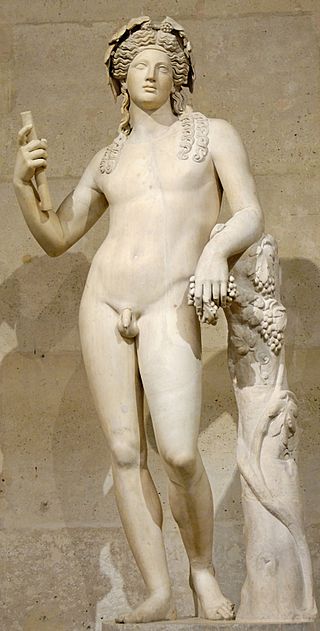
Euripides was a tragedian of classical Athens. Along with Aeschylus and Sophocles, he is one of the three ancient Greek tragedians for whom any plays have survived in full. Some ancient scholars attributed ninety-five plays to him, but the Suda says it was ninety-two at most. Of these, eighteen or nineteen have survived more or less complete. There are many fragments of most of his other plays. More of his plays have survived intact than those of Aeschylus and Sophocles together, partly because his popularity grew as theirs declined—he became, in the Hellenistic Age, a cornerstone of ancient literary education, along with Homer, Demosthenes, and Menander.

In ancient Greek religion and myth, Dionysus is the god of wine-making, orchards and fruit, vegetation, fertility, festivity, insanity, ritual madness, religious ecstasy, and theatre. He was also known as Bacchus by the Greeks for a frenzy he is said to induce called baccheia. As Dionysus Eleutherius, his wine, music, and ecstatic dance free his followers from self-conscious fear and care, and subvert the oppressive restraints of the powerful. His thyrsus, a fennel-stem sceptre, sometimes wound with ivy and dripping with honey, is both a beneficent wand and a weapon used to destroy those who oppose his cult and the freedoms he represents. Those who partake of his mysteries are believed to become possessed and empowered by the god himself.

In Greek mythology, Cadmus was the legendary Greek hero and founder of Boeotian Thebes. He was, alongside Perseus and Bellerophon, the greatest hero and slayer of monsters before the days of Heracles. Commonly stated to be a prince of Phoenicia, the son of king Agenor and queen Telephassa of Tyre, the brother of Phoenix, Cilix and Europa, Cadmus traced his origins back to Poseidon and Libya.

In Greek mythology, maenads were the female followers of Dionysus and the most significant members of the thiasus, the god's retinue. Their name, which comes from μαίνομαι, literally translates as 'raving ones'. Maenads were known as Bassarids, Bacchae, or Bacchantes in Roman mythology after the penchant of the equivalent Roman god, Bacchus, to wear a bassaris or fox skin.

The Bacchae is an ancient Greek tragedy, written by the Athenian playwright Euripides during his final years in Macedonia, at the court of Archelaus I of Macedon. It premiered posthumously at the Theatre of Dionysus in 405 BC as part of a tetralogy that also included Iphigeneia at Aulis and Alcmaeon in Corinth, and which Euripides' son or nephew is assumed to have directed. It won first prize in the City Dionysia festival competition.

In Greek mythology, Ino was a Theban princess who later became a queen of Boeotia. After her death and transfiguration, she was worshiped as a goddess under her epithet Leucothea, the "white goddess." Alcman called her "Queen of the Sea", which, if not hyperbole, would make her a doublet of Amphitrite.

In Greek mythology, Tiresias was a blind prophet of Apollo in Thebes, famous for clairvoyance and for being transformed into a woman for seven years. He was the son of the shepherd Everes and the nymph Chariclo. Tiresias participated fully in seven generations in Thebes, beginning as advisor to Cadmus himself.
In ancient Greek religion and mythology, Iacchus was a minor deity, of some cultic importance, particularly at Athens and Eleusis in connection with the Eleusinian mysteries, but without any significant mythology. He perhaps originated as the personification of the ritual exclamation Iacche! cried out during the Eleusinian procession from Athens to Eleusis. He was often identified with Dionysus, perhaps because of the resemblance of the names Iacchus and Bacchus, another name for Dionysus. By various accounts he was a son of Demeter, or a son of Persephone, identical with Dionysus Zagreus, or a son of Dionysus.

The Dionysia was a large festival in ancient Athens in honor of the god Dionysus, the central events of which were the theatrical performances of dramatic tragedies and, from 487 BC, comedies. It was the second-most important festival after the Panathenaia. The Dionysia actually consisted of two related festivals, the Rural Dionysia and the City Dionysia, which took place in different parts of the year. They were also an essential part of the Dionysian Mysteries.

The satyr play is a form of Attic theatre performance related to both comedy and tragedy. It preserves theatrical elements of dialogue, actors speaking verse, a chorus that dances and sings, masks and costumes. Its relationship to tragedy is strong; satyr plays were written by tragedians, and satyr plays were performed in the Dionysian festival following the performance of a group of three tragedies. The satyr play's mythological-heroic stories and the style of language are similar to that of the tragedies. Its connection with comedy is also significant – it has similar plots, titles, themes, characters, and happy endings. The remarkable feature of the satyr play is the chorus of satyrs, with their costumes that focus on the phallus, and with their language, which uses wordplay, sexual innuendos, references to breasts, farting, erections, and other references that do not occur in tragedy. As Mark Griffith points out, the satyr play was "not merely a deeply traditional Dionysiac ritual, but also generally accepted as the most appropriate and satisfying conclusion to the city’s most complex and prestigious cultural event of the year."

The Dionysian Mysteries were a ritual of ancient Greece and Rome which sometimes used intoxicants and other trance-inducing techniques to remove inhibitions and social constraints, liberating the individual to return to a natural state. It also provided some liberation for men and women marginalized by Greek society, among which were slaves, outlaws, and non-citizens. In their final phase the Mysteries shifted their emphasis from a chthonic, underworld orientation to a transcendental, mystical one, with Dionysus changing his nature accordingly. By its nature as a mystery religion reserved for the initiated, many aspects of the Dionysian cult remain unknown and were lost with the decline of Greco-Roman polytheism; modern knowledge is derived from descriptions, imagery and cross-cultural studies.

The Bassarids is an opera in one act and an intermezzo, with music by Hans Werner Henze to an English libretto by W. H. Auden and Chester Kallman, after Euripides's The Bacchae.

Sparagmos is an act of rending, tearing apart, or mangling, usually in a Dionysian context.

Brad Mays is a multi award-winning independent filmmaker and stage director, living and working in Los Angeles, California.

In Greek mythology, Orpheus was a Thracian bard, legendary musician and prophet. He was also a renowned poet and, according to the legend, travelled with Jason and the Argonauts in search of the Golden Fleece, and even descended into the underworld of Hades, to recover his lost wife Eurydice.

Lorenda Starfelt was an independent film producer, as well as a committed political activist and blogger who notably dug up president Barack Obama's birth announcement in an August 1961 edition of The Honolulu Advertiser while researching her documentary on the 2008 presidential election, The Audacity of Democracy.

Kim Weild is a Drama Desk Award-nominated American theatre director, educator, writer, actor and choreographer.

Dionysus in '69 is a 1970 film by Brian De Palma, Robert Fiore and Bruce Rubin. The film records a performance of The Performance Group's stage play of the same name, an adaptation of The Bacchae. It was entered into the 20th Berlin International Film Festival.
Dionysus in 69 was a theatrical production directed and conceived by Richard Schechner, founder and longtime artistic director of the Performance Group (TPG), a New York-based experimental theater troupe. An adaptation of The Bacchae by Greek playwright Euripides, Dionysus in 69 was an example of Schechner's practice of site-specific theatre, utilizing space and the audience in such ways as to bring them in close contact with each other. Dionysus in 69 challenged notions of the orthodox theater by deconstructing Euripides' text, interpolating text and action devised by the performers, and involving the spectators in an active and sensory artistic experience. Brian de Palma, Bruce Joel Rubin, and Robert Fiore made a film of Dionysus, merging footage from the final two performances of the play in July 1969.
The Gods of Comedy is a play by American playwright Ken Ludwig. It was first produced as a co-production between McCarter Theatre and Old Globe Theatre. It was directed by Amanda Dehnert, with Scenic Design by Jason Sherwood, Costume Design by Linda Roethke, Wig and Makeup Design by Carissa Thorlakson, Lighting Design by Brian Gale, Sound Design by Darron L West, Illusion Design by Jim Steinmeyer and Choreography by Ellenore Scott. It opened at McCarter Theatre on March 16, 2019 and at Old Globe Theatre on May 16, 2019.



















